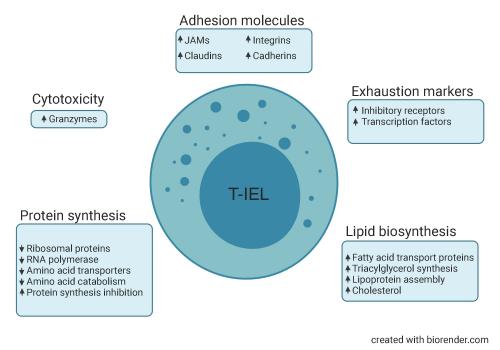
Research from the MRC PPU has shed new light into how immune cells tolerate the presence of harmless food and symbiotic bacteria in the gut, preventing needless immune responses and inflammation in the gut. The new study is published in eLife.
Within the lining of the gut are a specialized subset of immune cells that are tasked with protecting the gut from infection, by killing the infected epithelial cells that line the intestinal walls. It has always been unclear how these immune cells don’t attack the gut when there is no infection, despite the fact that the gut is full of bugs, potentially noxious chemicals, and the like.
In this study, Dr. Swamy’s lab explored how these gut immune cells are able to maintain a tolerant state in the absence of any overt stress or infection in the gut. For this, they collaborated with Professor Angus Lamond’s lab to explore the proteins expressed by these immune cells, using cutting-edge proteomics technologies.
Alejandro Brenes, co-first author on the paper and postgraduate researcher in the School of Life Sciences said “ We found that these intestinal immune cells are really unique. They have multiple layers of regulation that help to maintain their quiescent state, including metabolic suppression implying a high energy barrier for activation, expression of many inhibitory receptors, and modification of the signalling pathways that make it harder to trigger these cells.”
Co-first author, Dr. Maud Vandereyken added “Moreover, we identified expression of a key transcription factor, TOX, a master regulator of gene expression in cells, that may help to keep these cells tolerant of their environment.”
Dr. Swamy said, “This study has helped us better understand how these cells maintain the balance in the gut, which will be really important for us to understand how there is a loss of this balance, or a breakdown of tolerance in inflammatory bowel diseases. We hope that our future research in this direction will bring new idea to the treatment of inflammatory bowel diseases.”
The data on which the study was based are freely available in an easily accessible format on the Immunological Proteome resource webpage www.immpres.co.uk.
The research was supported by a Wellcome Trust grant to Dr. Mahima Swamy, a Wellcome Trust Strategic award to Professors Angus Lamond and Doreen Cantrell, and equipment and facilities funded by a UK Research Partnership Investment Fund (UKRPIF) grant, awarded by Research England in partnership with the Scottish Funding Council.


